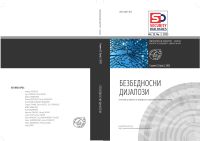COVID-19: IMPLICATIONS AT NATIONAL AND GLOBAL LEVELS
COVID-19: IMPLICATIONS AT NATIONAL AND GLOBAL LEVELS
Author(s): Dragan Trivan, Slavisa Kristic, Ena TodorovićSubject(s): Social Sciences
Published by: Филозофски факултет, Универзитет "св. Кирил и Методиј"
Keywords: COVID-19 pandemic; conspiracy theories; vaccination; restrictive measures; consequences
Summary/Abstract: The COVID-19 pandemic is in its third year and it has affected all continents, causing the biggest international crisis after the Second World War. Although the global vaccination process began in the beginning of 2021, continuous mutations and the emergence of new coronavirus strains have made it impossible to put the pandemic under control, leading to a wave of massive spread of the disease across the planet and causing the death of several millions of people. The very present anti-vaccine propaganda and the expressed resistance to vaccination have made the vaccination process of the population in many countries much slower and with less coverage than expected. Authorities in many countries have resorted to radical measures in the past period, including closing borders, rigorous surveillance, long-lasting and discriminatory restrictions on freedom of movement and assembly. The circumstances of the pandemic outbreak are not much clearer today than they were in the beginning, which is in favour of the widespread conspiracy theories, being promoted through social networks and internet portals. Economic consequences of the coronavirus are primarily linked to a significant decline in global GDP, reduced investment and the range of international trade, the rise in unemployment, the rise of fiscal and public debts, especially during the first year of the pandemic. At the same time, the most powerful corporations, primarily in the pharmaceutical industry, reached the point of making extra profits. The already existing inequalities in healthcare and economic positions within national countries, as well as the differences among countries and regions, increased during the COVID-19 pandemic. Despite the general trend of increasing state aid and subsidies, the consequence of the coronavirus affected more vulnerable social groups much more severely. With general negative consequences in the medium term, the pandemic could encourage the acceleration of technological innovations, further change son the labour market and development of artificial intelligence in the long run. The world will not be the same in any case after the coronavirus, and along with other, things will change towards creating a safer society, with a higher level of healthcare and safety cultures.
Journal: Bezbednosni dijalozi
- Issue Year: 13/2022
- Issue No: 2
- Page Range: 85-104
- Page Count: 20
- Language: English

